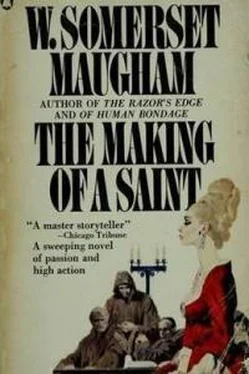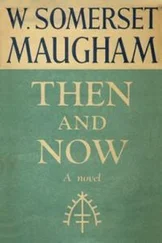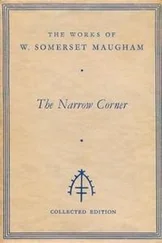With that he dismissed them.
When the people heard the news, there was great excitement. The murmurs against the Count, which had hitherto been cautiously expressed, were now cried out in the market–place; the extravagance of the Countess was bitterly complained of, and the townsmen gathered together in groups, talking heatedly of the proposed exaction, occasionally breaking out into open menace. It was very like sedition.
On the day after the council, the head of the customs had been almost torn to pieces by the people as he was walking towards the Palace, and on his way back he was protected by a troop of soldiers. Antonio Lassi was met everywhere with hoots and cries, and Checco d'Orsi, meeting him in the loggia of the piazza, had assailed him with taunts and bitter sarcasms. Ercole Piacentini interposed and the quarrel nearly ended in a brawl; but Checco, with difficulty restraining himself, withdrew before anything happened….
On leaving Donna Giulia, I walked to the piazza. and found the same restlessness as on the preceding days. Through all these people a strange commotion seemed to pass, a tremor like the waves of the sea; everywhere little knots of people were listening eagerly to some excited speaker; no one seemed able to work; the tradesmen were gathered at their doors talking with one another; idlers were wandering to and fro, now joining themselves to one group, now to another.
Suddenly there was a silence; part of the crowd began looking eagerly in one direction, and the rest in their curiosity surged to the end of the piazza to see what was happening. Then it was seen that Caterina was approaching. She entered the place, and all eyes were fixed upon her. As usual, she was magnificently attired; her neck and hands and arms, her waistband and headgear, shone with jewels; she was accompanied by several of her ladies and two or three soldiers as guard. The crowd separated to let her pass, and she walked proudly between the serried rows of people, her head uplifted and her eyes fixed straight in front, as if she were unaware that anyone was looking at her. A few obsequiously took off their hats, but most gave no greeting; all around her was silence, a few murmurs, an oath or two muttered under breath, but that was all. She walked steadily on, and entered the Palace gates. At once a thousand voices burst forth, and after the deadly stillness the air seemed filled with confused sounds. Curses and imprecations were hurled on her from every side; they railed at her pride, they called her foul names…. Six years before, when she happened to cross the streets, the people had hurried forward to look at her, with joy in their hearts and blessings on their lips. They vowed they would die for her, they were in ecstasies at her graciousness.
I went home thinking of all these things and of Donna Giulia. I was rather amused at my unintentional kiss; I wondered if she was thinking of me…. She really was a charming creature, and I was glad at the idea of seeing her again on the morrow. I liked her simple, fervent piety. She was in the habit of going regularly to mass, and happening to see her one day, I was struck with her devout air, full of faith; she also went to confessional frequently. It was rather absurd to think she was the perverse being people pretended….
When I reached the Palazzo Orsi I found the same excitement as outside in the piazza, Girolamo had heard of the dispute in the loggia, and had sent for Checco to hear his views on the subject of the tax. The audience was fixed for the following morning at eleven, and as Checco never went anywhere without attendants, Scipione Moratini, Giulia's second brother, and I were appointed to accompany him. Matteo was not to go for fear of the presence of the two most prominent members of the family tempting the Count to some sudden action.
The following morning I arrived at San Stefano at half–past nine, and to my surprise found Giulia waiting for me.
'I did not think you would be out of the confessional so soon,' I said. 'Were your sins so small this week?'
'I haven't been,' she answered. 'Scipione told me that you and he were to accompany Checco to the Palace, and I thought you would have to leave here early, so I postponed the confessional.'
'You have preferred earth and me to Heaven and the worthy father?'
'You know I would do more for you than that,' she answered.
'You witch!'
She took my arm.
'Come,' she said, 'come and sit in one of the transept chapels; it is quiet and dark there.'
It was deliciously cool. The light came dimly through the coloured glass, clothing the marble of the chapel in mysterious reds and purples, and the air was faintly scented with incense. Sitting there she seemed to gain a new charm. Before, I had never really appreciated the extreme beauty of the brown hair tinged with red, its wonderful quality and luxuriance. I tried to think of something to say, but could not. I sat and looked at her, and the perfumes of her body blended with the incense.
'Why don't you speak?' she said.
'I'm sorry; I have nothing to say.'
She laughed.
'Tell me of what you are thinking.'
'I daren't,' I said.
She looked at me, repeating the wish with her eyes.
'I was thinking you were very beautiful.'
She turned to me and leant forward so that her face was close to mine; her eyes acquired a look of deep, voluptuous languor. We sat without speaking, and my head began to whirl.
The clock struck ten.
'I must go,' I said, breaking the silence.
'Yes,' she answered, 'but come to–night and tell me what has happened.'
I promised I would, then asked whether I should lead her to another part of the church.
'No, leave me here,' she said. 'It is so good and quiet. I will stay and think.'
'Of what?' I said.
She did not speak, but she smiled so that I understood her answer.
I hurried back to the Palazzo and found Scipione Moratini already arrived. I liked him for his sister's sake, but in himself he was a pleasant person.
Both he and his brother had something of Giulia in them—the delicate features, the fascination and the winning ways which in them seemed almost effeminate. Their mother had been a very beautiful woman—report said somewhat gay—and it was from her the sons had got the gallantry which made them the terror of husbands in Forli, and Giulia the coquetry which had given rise to so much scandal. The father, Bartolomeo, was quite different. He was a rugged, upright man of sixty, very grave and very dignified, the only resemblance of feature to his children being the charming smile, which the sons possessed as well as Giulia; though in him it was rarely seen. What I liked most in him was the blind love for his daughter, leading him to unbend and become a youth to flatter her folly. He was really devoted to her, so that it was quite pathetic to see the look of intense affection in his eyes as he followed her movements. He, of course, had never heard a word of the rumours circulating about Giulia; he had the utmost faith in her virtue, and I, it seems to me, had gained faith from him.
After talking a while with Scipione, Checco came, and we started for the Palazzo. The people in Forli know everything, and were well aware of Checco's mission. As we walked along we were met by many kind greetings, good luck, and God speed were wished us, and Checco, beaming with joy, graciously returned the salutations.
We were ushered into the council chamber, where we found the councillors and many of the more prominent citizens, and several gentlemen of the Court; immediately the great folding doors were opened and Girolamo entered with his wonted state, accompanied by his courtiers and men–at–arms, so that the hall was filled with them. He took his seat on a throne, and graciously bowed to the left and to the right. His courtiers responded, but the citizens preserved a severe aspect, quite unsympathetic towards his condescension.
Читать дальше











